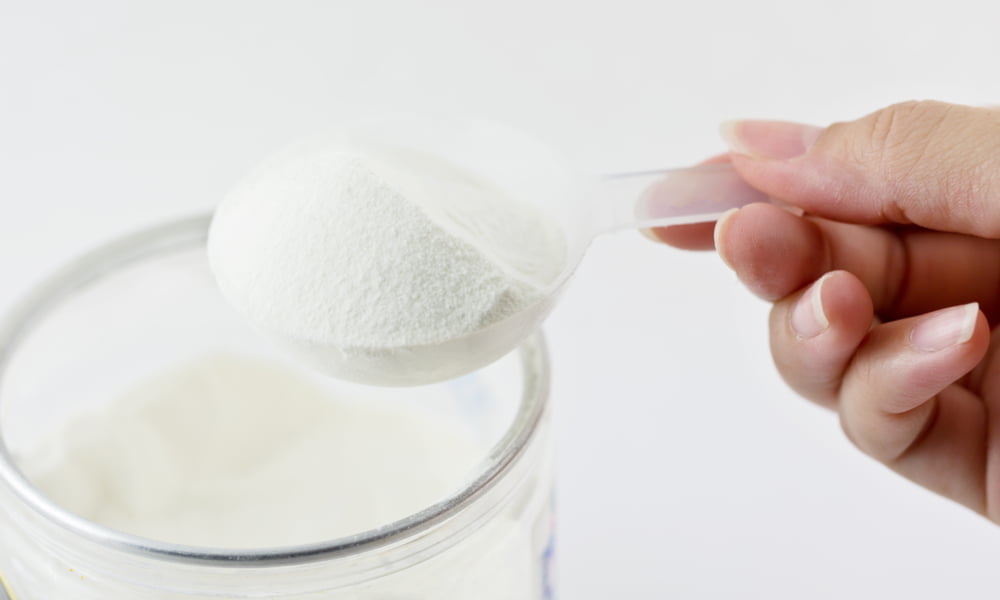This peppermint white chocolate creamer is the perfect way to enjoy your favourite holiday coffee…
Most people know about collagen. Many add it to their blended coffees for extra frothiness, or to their smoothies for a subtle nutrient boost. What many don’t know is that collagen can come from different sources and that there are two main types out there: bovine and marine. So, why does this matter? What’s the difference?
The Scoop
First, let’s start with a rundown of collagen itself. What is it? Collagen is one of the main proteins in the body and makes up most of our body’s tissues, muscles, bones, skin, hair, digestive system, and tendons–to name a few. Some refer to it as the “glue” that holds the body together. As we age, our collagen production naturally decreases. Extreme sun exposure and improper diets (mostly high-sugar ones) speed this up. That’s why it can be helpful to up our collagen intake via supplementation.
Why Is It Good For Us?
Skin and Hair Perks
Collagen is great for a number of reasons. Most notably, it can improve skin and hair health. Since our natural collagen production decreases with age and sun exposure, this often shows up in our skin. Collagen can help improve skin elasticity.
Gut Health
It can also help repair our intestinal lining. Sometimes referred to as the “superfood of gut health,” collagen can be a superhero for many digestive diseases (such as IBS, Crohn’s, or leaky gut). Basically, it can infuse the gut lining with its ample amino acids, and this can help repair any gaps.
Other Great Stuff
Collagen can help in other ways too! It can help stabilize blood sugar, improve bone strength, lower cholesterol levels, and improve wound healing.
The Differences Between Marine and Bovine
Bovine
Bovine collagen comes from cows. Not to get too graphic, but more specifically from the discarded skin, bones, and muscles of cows (so it’s especially important to choose pasture-raised and grass-fed for the best quality!). Bovine contains both Type 1 and 3 collagen. Type 1 is the most abundant form in the body (mostly in skin, hair, bones etc), while Type 3 is found particularly in our intestines and is necessary for gut lining repair. Since bovine contains more Type 3, it might be best for those with intestinal concerns. Also, bovine is often slightly cheaper than marine collagen. If you’re taking collagen to improve gut health and are on a bit of a budget, bovine might be a better choice.
Marine
Marine collagen comes from fish–either the skin, bones, or scales. If you’re a pescetarian and want to eat collagen, this is the type for you. Marine is solely Type 1. Because Type 1 is the most abundant form in the body, marine collagen is the ideal choice for a quick collagen fix. It also has smaller particles, so it’s easier for digestion and quick absorption1. Another bonus is that marine collagen is environmentally friendly (roughly 60% of fish processing by-products turn into waste2). So, if you’re taking collagen supplementation to improve skin and hair health and want fast results (and want to reduce fish waste!), marine might be the winner.
The Verdict
Basically, both bovine and marine provide nearly the same benefits. Both are great for skin, hair, gut and bone health. However, bovine is slightly cheaper and might be the better choice for those with intestinal problems. On the other hand, marine collagen might be a better choice for those wanting faster results from collagen, those with skin and hair concerns, and for those that don’t eat cow products. Either way, they’re both beneficial
Find collagen at any of our stores, or look at these collagen recipes for ways to add it to your diet!
Sources:
1: http://file.scirp.org/Html/13-2701752_61421.htm
2: https://www.furtherfood.com/what-is-marine-collagen-peptides-marine-collagen-benefits/


